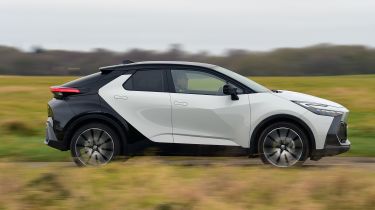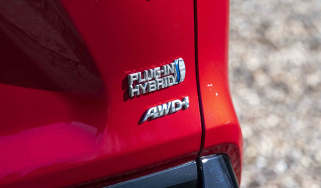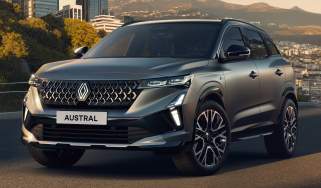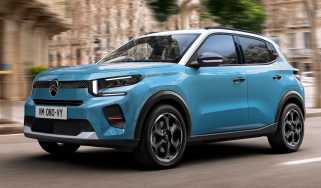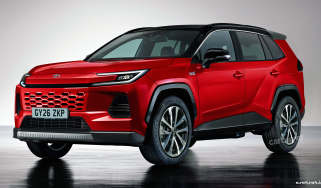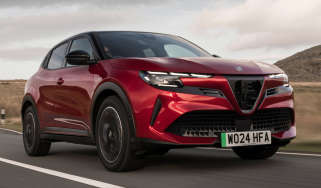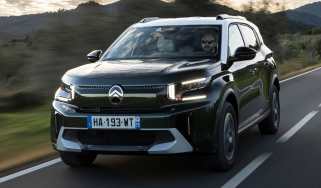Toyota C-HR review – Engines, drive & performance
“Good to drive around town and decent handling, but there are more sporting SUVs for faster-paced driving”
While we expect the C-HR’s handling to be fairly similar across the range, how it goes will, of course, depend on the powertrain you pick. In most cases, we’d recommend the 1.8-litre for short hops and town driving, where it excels. If you want to stick with a hybrid and really need more performance, the more expensive 2.0-litre has a convincing extra turn of speed for joining motorways, overtaking and driving in hilly areas, while the plug-in hybrid has its own unique personality.
We were impressed with the C-HR’s road manners, with a supple feel from the suspension over bumps, without it feeling soft enough to lack control or composure. It’s a trait that works well in the UK, where the roads are both lumpy but also demanding, with lots of twists and turns. Despite the fact our GR Sport test car was fitted with the largest 20-inch wheels, the ride was still comfortable, but for the utmost comfort with a smooth ride, you’ll be better off with the smaller 17-inch alloys.
Hybrid models
The range kicks off with a familiar hybrid packing a 1.8-litre petrol engine, electric motor and small battery. It doesn’t appear very quick on paper, but the linear power delivery of its CVT automatic gearbox helps it to keep up with traffic around town. It’s also able to switch off its petrol engine an impressive amount in urban driving, considering the small size of its self-charging hybrid battery. Like before, it’s also a car best suited to calm driving, because heavy acceleration will see its engine revs flare. The downside to its CVT gearbox is that the engine can drone quite a lot under hard acceleration.
More reviews
Above it there’s a 2.0-litre version and with a useful increase in power it feels more comfortable than both the 1.8-litre car and its predecessor. We wouldn’t go as far as saying it’s truly entertaining to drive, and a heavy right foot will still send the revs soaring, but you don’t need to push it too hard to make good progress, and the engine settles right down on the motorway.
|
Model |
Power |
0-62mph |
Top speed |
|
1.8 hybrid petrol |
138bhp |
10.2 seconds |
106mph |
|
2.0 hybrid petrol |
195bhp |
8.1 seconds |
112mph |
Plug-in hybrid models
Toyota is synonymous with hybrid models, so perhaps that’s why it has been rather slow to introduce PHEV and battery-electric models. Now a C-HR with a plug has arrived, it should broaden the appeal of the already-popular SUV to even more buyers, particularly company car drivers thanks to its cheaper Benefit-in-Kind (BIK) taxation.
Its 0-62mph dash certainly makes it the quickest C-HR too, although that likely won’t be of concern to the drivers looking to squeeze a few more miles out of the battery before the 2.0-litre petrol engine kicks in.
We’ve now tested the PHEV version, and it doesn’t differ too significantly from the regular C-HR. Despite the extra 200kg of its battery, the C-HR remains composed and precise along a winding road. Thanks to the extra power of its electric motor, the issue of flaring revs as you accelerate is less apparent, although it’s still possible under heavy acceleration, and even the range-topping C-HR feels most at home in urban driving.
There are lots of driving modes, from EV which prioritises using energy from the battery until it’s empty, to ‘HV’ mode that maintains the battery charge and ‘Auto/HV’ that uses both the petrol engine and battery power depending on your driving style and even navigation data. It’s also possible to adjust the level of regenerative braking, with the strongest setting providing near one-pedal driving.
|
Model |
Power |
0-62mph |
Top speed |
|
2.0 plug-in hybrid petrol |
220bhp |
7.4 seconds |
112mph |
Electric models
There’s no fully electric version of the C-HR on the cards yet, so if you want a zero-emission (at the tailpipe at least) Toyota, you’ll need to step up to the Toyota bZ4X. There are quite a few electric small SUVs to pick from too, including the Hyundai Kona – our favourite small family car – and models like the MG4, Peugeot E-2008 and Volvo EX30.
Which Is Best?
Cheapest
- Name1.8 Hybrid Icon 5dr CVT
- Gearbox typeAuto
- RRP£31,440
Most Economical
- Name2.0 PHEV Design 5dr CVT
- Gearbox typeAuto
- RRP£39,230
Fastest
- Name1.8 Hybrid Icon 5dr CVT
- Gearbox typeAuto
- RRP£31,440

